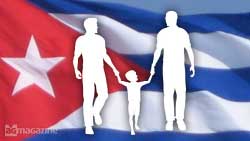In paying for sex changes, Cuba breaks from past
- Submitted by: admin
- Health and Medicine
- 04 / 10 / 2010

Looking in the mirror used to make Yiliam Gonzalez sick to her stomach.
"I would see myself, and my body didn't match who I was," said the 28-year-old wedding pianist, who went by William before receiving a sex change under Cuba's universal health-care system.
Standing 6 feet tall with shoulder-length blond hair, heavy makeup and an ID card still bearing a man's name, Gonzalez underwent the procedure in 2008. She was one of eight Cubans to do so through a program begun in 1988 -- then suspended for
two decades, after many complained that the communist government had better ways to spend its scarce resources.
The operations have begun anew under President Raul Castro's daughter, Mariela, who is Cuba's top gay-rights activist. There are 22 more transsexuals waiting to have the surgery.
Mariela Castro says the government is moving cautiously, doing only a few per year.
"There has been a lot of resistance because homophobia remains strong in our culture," she said at a recent conference on sexuality.
In the 1960s, Cuba was ferociously anti-gay, firing homosexuals from state jobs, imprisoning them or sending them to work camps. Many fled into exile.
Transsexuals, though not gay, were considered the same.
While gay jokes remain common in Cuba, government media campaigns now discourage homophobia. Hundreds of gay Cubans marched down Havana's spiffy "La Rampa" boulevard last spring, just a year after authorities had forbidden a gay-pride parade.
"I'd like to think that discrimination against homosexuals is a problem that is being overcome," former President Fidel Castro said during a series of interviews with French journalist Ignacio Ramonet between 2003 and 2005.
"Old prejudices and narrow-mindedness will increasingly be things of the past."
Mariela Castro has seen to it that the state formally recognizes transsexuals. A state-trained kindergarten teacher with a degree in sexuality, she runs the National Sexual Education Center. It spent years lobbying communist officials, who finally
agreed to lift bans on sex changes in 2008 -- though the resolution was never made public to avoid unwanted attention.
"These processes of negotiation are sometimes done very quietly," Mariela Castro said, "so as not to stir up ghosts."
She now says financial concerns in the past were simply used to hide prejudices.
That's not unusual, said Denise Leclair, executive director of the Washington-based International Foundation for Gender Education.
"In many countries, people complain bitterly. It's primarily driven by religious beliefs," Leclair said.
Religious objections weren't a problem in Cuba, which was officially atheist for decades. Instead, many Cubans claimed that their country was too poor to pay for the procedure, writing letters to the editor in the Communist Party newspaper Granma after the first successful Cuban surgery was announced in 1988.
Leclair said a male-to-female change can cost $10,000 to $25,000 in the U.S., or up to four times higher than that, depending on all the procedures performed. About a dozen American doctors do between 1,000 and 2,000 such operations a year, she said.
Canada, Britain, France and Brazil offer government-financed sex changes, among other countries.
San Francisco began paying for sex changes for city and county employees in 2001, and Fort Worth, Texas, is considered following suit. Some large employers, including IBM and the University of California, negotiated contracts with their private insurers to cover the procedure known medically as "sexual reassignment surgery," and other insurance companies have begun covering at least part of the treatments.
Still, Leclair said most of the largest U.S. insurers don't cover the surgery.
Cuba won't say how much its sex change costs, but doctors earn state salaries worth an average of about $20 per month. Cuban physicians received training from visiting Belgians on how to do the surgeries, and doctors from both countries were present
during the procedures.
Olivia Lam, who was born Alfonso Manuel, has been waiting for sex-change surgery for two years. While her name has not been changed, authorities allowed her to take a new picture for her ID card -- one where she is dressed as a woman.
"The picture is me, even if the name is not," said Lam, a gregarious 43-year-old.
Gonzalez and Lam say they think the delay in getting ID cards is because of the slow Cuban bureaucracy and not any kind of government resistance.
Lam, who works as a hairdresser out of her two-room apartment, first began cross-dressing at 21. Though she has been formally classified as transsexual since 2008, she has no way of knowing when -- or if -- approval for sex-change surgery will come.
And though the government now accepts her, Lam acknowledged that getting her own family to has not been easy.
"I don't think any parent wants their son to be different," she said, "but they understand that you're not like this because you want to be."
By Will Weissert The Associated Press
Source: www2.timesdispatch.com/
Comments